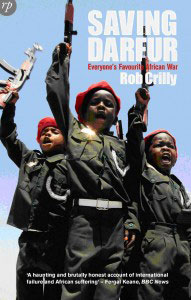Our Favorite African War

Brit foreign correspondent Rob Crilly (currently covering East Africa for The IrishTimes), having covered wars in Darfur, Somalia, and the Democratic Republic of Congo, has spent five years in Sudan, and his book, Saving Darfur: Everyone’s Favourite African War (Reportage Books), both clarifies a conflict that he convincingly argues has been seriously misrepresented and misunderstood and insists that the Save Darfur movement has been counterproductive.
By focusing on criminalizing a government and making military intervention the top priority [the movement] has made peace more elusive and increased the suffering of ordinary Darfuris.
Phillip Hammond’s review commends Crilly’s honesty and goes on to describe his measured and eloquent voice in Saving Darfur:
Although this is a personal account, full of colourful anecdotes and wry asides, Crilly resists the temptation to put himself at the centre of the story. Since the early 1990s the fashion has been for Western journalists to use other people’s wars as a backdrop for their own existential voyages of moral self-discovery. Crilly’s more down-to-earth approach shuns the simplification and narcissism of that emotive and ‘attached’ style of journalism. Arriving in Sudan in September 2004, shortly after then-U.S. secretary of state Colin Powell had described the situation in Darfur as ‘genocide,’ Crilly quickly finds that the war as understood in the West is ‘slipping out of focus,’ as ‘black and white certainties’ start ‘mixing into grey.’ Rather than seeking, as so many have done, to speak on behalf of the victims of conflict, Crilly’s aim is to ‘broadcast the real voices from the aid camps, the rebel villages, and the Arab camel markets’.
It should not go unnoted that Crilly’s publisher, Reportage Press, is a new publishing house “specializing in books on foreign affairs or set in foreign countries; non-fiction, fiction, essays, travel books, old travel memoirs, or just books written from a stranger’s view (all our books give a percentage of the profits to a charity chosen by the author).”
Good for them.
